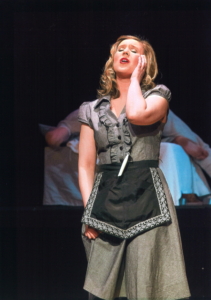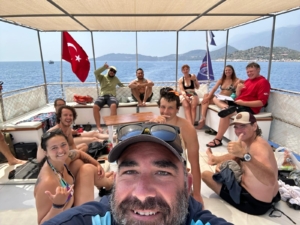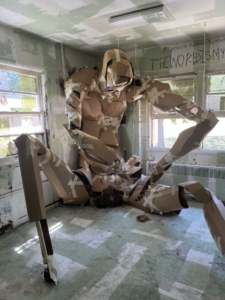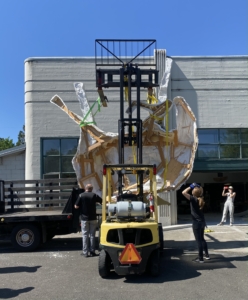The immersive realm of music and vocal arts defines the vibrant Music Program at Southern Oregon University, attracting a multitude of students who follow the enriching curriculum and ultimately forge dynamic careers in the performing arts. From powerful choral ensembles to the intimate cadence of solo performances, SOU’s commitment to musical excellence resonates, providing a captivating blend of education and artistic passion.
Jerron Jorgensen, the new director of Choral Studies at SOU, brings a wealth of experience from his tenure at the small liberal arts college Coker University, where he – along with his wife, Christi Mclain – revitalized the vocal arts program into a wholly reimagined experience. Before landing at Coker University, Jerron completed his doctorate in musical arts at the University of Hartford after finishing his masters at Arizona State University. Jerron came to SOU in 2022, filling the vacancy that Paul French left when he retired.
 Coming to SOU was an easy choice for Jorgensen – the combination of a small campus, the beauty of the geographic area and the vibrant arts community of the Rogue Valley made this an attractive location to teach vocal music. His musical journey is marked by a diverse range of experiences, encompassing professional roles as a conductor, soloist, chorister, teacher and arranger. He is also the new music director for the Rogue Valley Chorale.
Coming to SOU was an easy choice for Jorgensen – the combination of a small campus, the beauty of the geographic area and the vibrant arts community of the Rogue Valley made this an attractive location to teach vocal music. His musical journey is marked by a diverse range of experiences, encompassing professional roles as a conductor, soloist, chorister, teacher and arranger. He is also the new music director for the Rogue Valley Chorale.
Christi McLain, an adjunct instructor of music at SOU with her roots in Nebraska, discovered her passion for singing at a young age. She fondly recalls watching a performance of Cleopatra and falling in love with the opera form. She has since been dedicated to making this art form accessible to diverse audiences.
Christi and Jerron are creative partners – married with two adopted children – and together, they have brought to SOU Lyric Theatre, a new program and class scheduled for the 2024 winter term, that aims to redefine traditional notions of chamber music and the vocal arts by supporting creativity, accessibility and relevance in the contemporary artistic landscape. Students will learn, produce and perform an intimate retelling of the story of Zelda as a jazz opera with the composer and the libretto coming to SOU as visiting artists. The class and program, as designed by Jerron and Christi, embodies the ethos of an adapting performing arts world that draws inspiration from diverse musical traditions.
“Our main goal is to stay nimble from year to year, allowing our programmatic choices and the unique cohort of students to shape our performances, venues and community engagements,” Jerron says. “The idea is for it to look a little bit different every single year, reflecting the evolving dynamics of our artistic pursuits. We want to promote the works of living American composers in both the voice and choral realms.”
This vision aligns with the way the performing arts is changing in the United States, and Christi and Jerron see the opportunity to expand SOU’s program to meet those changes.
“The vocal arts landscape is undergoing a metamorphosis, with major companies redefining their seasons, diversifying repertoires, and embracing a departure from the traditional canon,” Christi says.
It’s a departure not just in terms of repertoire but a paradigm shift toward living composers, contemporary narratives and a harmonious blend of styles – a fusion that extends beyond the operatic realm. Jazz influences, musical theater nuances and a medley of styles converge to create a rich, dynamic narrative.
Jerron explains that boutique companies have become a groundbreaking force in reshaping the vocal arts landscape. Their emergence signifies a departure from the traditional, prompting a reevaluation of the storytelling standard, demonstrating that impactful narratives can thrive without the need for extravagant expenditures. This signifies a grassroots movement in the realm of chamber music. These small-scale productions offer artistically compelling narratives and music, and present a practical accessibility. The productions are innovative in that they challenge traditional notions of the art form, breaking away from the confines of concert halls and adapting to spaces more accessible to diverse audiences – like bookstores, houses or other experimental locations.
This is the vision of lyric theatre that Jerron and Christi want to bring to students at SOU, and this artistic vision is reflected in the teaching styles they’ve each developed over years of practice.
At the core of Jerron’s teaching philosophy is his commitment to cultivating a safe and inclusive space for students. This safety is about creating an environment where student opinions and identities are respected and celebrated. Jerron aims to affirm student experiences and foster a creative atmosphere. Simultaneously, his role extends to challenging and pushing students, not solely in technical aspects, but in expanding their worldview and understanding their societal impact through the art form they are immersed in.
“It’s about nurturing growth, both artistically and as individuals making meaningful contributions to their communities,” Jerron says.
The guiding principle of Christi’s teaching philosophy is integrity – a commitment to the students, the art form, their voice and the repertoire presented to them. She encourages an environment where bravery and vulnerability thrive, urging students to embrace risks, potential failures and the inherent messiness of artistic exploration. Rather than molding them into replicas of renowned singers, Christi emphasizes the journey of becoming their best selves as singers. The intense focus on details, such as tongue position and jaw release, creates an immersive and fulfilling experience. Amid this intensity, she emphasizes the profound significance of their artistic endeavors, dispelling any notion that their contributions lack importance.
“It’s about helping students recognize the immense value that the vocal arts hold in society and empowering them to find and articulate their unique voice in this powerful art form,” Christi says.
Jerron and Christi – stewards of vocal artistry at SOU – are redefining the academic landscape by acknowledging the evolving reality for singers in today’s world. Their visionary approach imparts technical expertise and also instills an entrepreneurial spirit, guiding students toward the realization that a career in the arts is a nuanced journey, often marked by freelancing and carving one’s own path. This educational model echoes the sentiment that success in the arts is found in the innovative spirit of creating, administering and performing in non-traditional spaces. The students, under the tutelage of Jerron and Christi, will embark on a transformative journey where the intersection of creativity and pragmatism defines their narrative.
“While not everyone may go on to sing at iconic venues like The Met, we want to prepare students for diverse career paths, connecting them with relevant repertoire, composers and librettists,” Christi says.
Their collective goal is to ensure that their students graduate with the skills needed to succeed in various aspects of the performing arts world, from regional companies to graduate schools, contributing to the preservation and evolution of the vocal arts.
Jerron highlights the profound upheavals underway in the performing arts, catalyzed by factors such as shifting demographics and technological advancements, even before the pandemic. COVID-19, however, acted as an accelerant, forcing a reevaluation of longstanding traditions within the performing arts. The classical music and operatic realms, traditionally reliant on older generations for support, are now facing an existential challenge as this model proves unsustainable. Jerron foresees a necessity for widespread adaptation across the country. As attention spans shrink in the era of smartphones and streaming services, the very nature of the art form must evolve to captivate contemporary audiences, presenting a unique set of challenges and opportunities for those invested in its future.
“In our approach, we embrace the entrepreneurial nature of our activities, shaped by the curated repertoire we undertake,” Jerron says. “Unlike the rare, full-time positions with benefits found in large orchestras or renowned opera houses, the reality for most artists, including ourselves, is a freelance existence. This reality prompts the question: ‘How do we navigate, discover, and curate works that can be executed with a modest budget in unconventional settings?’”
Jerron emphasizes that the answer lies in a commitment to self-discovery, innovative programming and the administration of performances that carve out a niche for students.
“Students nowadays are navigating a dynamic landscape in vocal performance,” Jerron says. “It’s about creating your own opportunities, discovering works, and embracing the entrepreneurial aspects of the field. Our program is pioneering this perspective, preparing students for diverse and innovative careers.”
“I’m eager to astonish our students with music that defies their expectations,” Christi adds. “The beauty of lyric theatre resonates deeply within us, and I’m committed to pushing boundaries and surprising our audience. I’m excited to reveal the true awesomeness of lyric theatre to everyone.”
Jerron and Christi have arrived at SOU at a pivotal moment, offering renewed passion and energy to SOU’s Music Program and to students studying music at SOU.
“There’s a sense of immense promise and the feeling that we’re standing at the edge of significant change,” Jerron says. “The university’s direction holds vast possibilities, and it’s exciting to witness the transformation. There’s a collective effort to revamp, reimagine and introspect. Under the guidance of strong leadership, there’s a palpable eagerness among the faculty and students to be part of this renaissance.”
To learn more about SOU’s Music Program, visit SOU Music.
Story by Melissa Matthewson, SOU’s director of development communications




 The graduate students spent last winter and spring term planning the expeditions and then as the summer progressed the trip attendees left their homes for adventure. Each trip was going to focus on learning and growing in their own emotional intelligence through, trekking, bikepacking, SCUBA and white water rafting.
The graduate students spent last winter and spring term planning the expeditions and then as the summer progressed the trip attendees left their homes for adventure. Each trip was going to focus on learning and growing in their own emotional intelligence through, trekking, bikepacking, SCUBA and white water rafting.


 Coming to SOU was an easy choice for Jorgensen – the combination of a small campus, the beauty of the geographic area and the vibrant arts community of the Rogue Valley made this an attractive location to teach vocal music. His musical journey is marked by a diverse range of experiences, encompassing professional roles as a conductor, soloist, chorister, teacher and arranger. He is also the new music director for the
Coming to SOU was an easy choice for Jorgensen – the combination of a small campus, the beauty of the geographic area and the vibrant arts community of the Rogue Valley made this an attractive location to teach vocal music. His musical journey is marked by a diverse range of experiences, encompassing professional roles as a conductor, soloist, chorister, teacher and arranger. He is also the new music director for the 

 Parker adheres to this kind of philosophy – in teaching and art – by unveiling the inventive possibility of art and sculpture at SOU.
Parker adheres to this kind of philosophy – in teaching and art – by unveiling the inventive possibility of art and sculpture at SOU. Parker has brought this collaborative sensibility to SOU. Since his arrival on campus, he’s re-energized the sculpture program by coordinating and creating three very important projects. In 2022, Parker envisioned a temporary sculpture garden outside the DeBoer Sculpture Building on Siskiyou Boulevard, on land that had been underused and overgrown. In partnership with the Schneider Museum, they broke ground in the spring of 2023 and the Mary Campagna Sculpture Garden was reborn, effectively creating a new public face of the creative arts at SOU.
Parker has brought this collaborative sensibility to SOU. Since his arrival on campus, he’s re-energized the sculpture program by coordinating and creating three very important projects. In 2022, Parker envisioned a temporary sculpture garden outside the DeBoer Sculpture Building on Siskiyou Boulevard, on land that had been underused and overgrown. In partnership with the Schneider Museum, they broke ground in the spring of 2023 and the Mary Campagna Sculpture Garden was reborn, effectively creating a new public face of the creative arts at SOU.
